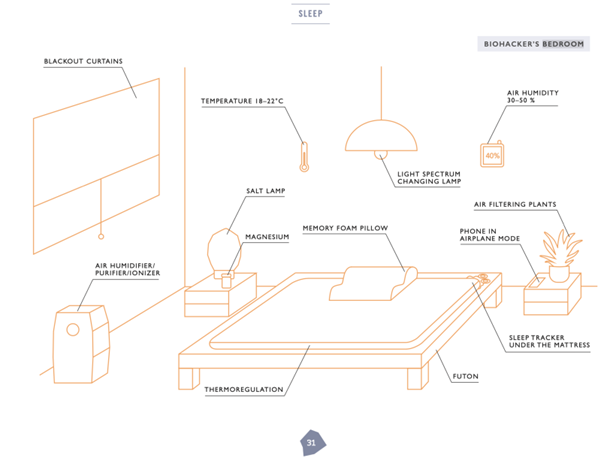EMBRACING SLEEP – Your Gateway to Vibrant Health

Sleep is not a pillar – it’s the concrete block that the pillars are built upon. So don’t bother obsessing too much with your food and exercise regime if you haven’t nailed your sleep – your health will lack a solid foundation.
Key benefits of sleep:
- Burn more fat AND keep it off
- Increase your intelligence and concentration
- Make you look and feel 10 years younger
- Have limitless energy during the day
- Protect against neurodegeneration and diabetes
- Lower your chance of dying prematurely by 13%
With so much on our plates, it’s easy to push sleep to the back burner. Here’s what you need to know about why it needs to be re-ordered in your list of priorities:
Why We Need Sleep and What Happens During Sleep
As Matthew Walker, a leading neuroscientist and sleep expert, eloquently puts it in his book, “Unlocking the Power of Sleep and Dreams,” there are hardly any biological functions that do not benefit from a good night’s sleep. Sleep is not a luxury; it’s a necessity. It’s during sleep that our bodies undergo a plethora of restorative processes. From cellular repair to memory consolidation, sleep is essential for maintaining optimal health and longevity. 1
Circadian Rhythm: Your Body’s Internal Clock
Ever heard of your body’s inner clock, the circadian rhythm? It orchestrates your body temperature, digestion, and hormone production. The catch? It’s a rhythm easily swayed by light. Bright sunlight during the day fine-tunes this clock, ensuring you’re alert. On the flip side, artificial light at night throws your rhythm out of tune, suppressing the sleep-inducing hormone, melatonin, the hormone that helps you fall asleep. This leads to sleepless nights and groggy mornings.
To counter this, consider:
- Eliminate your blue, LED lights and replacing with softer amber, incandescent ones. (Research shows that white LED lighting blocks the production of melatonin 5x more than incandescent light bulbs) 2
- Investing in blue light-blocking eyewear and software for your screens
- Reducing screen time 2 hours before bed.
Morning Rituals that Rock Your Night
A great night’s rest starts with your morning rituals. Getting up earlier and exposing your skin and eyes to the morning light while grounded, shoe-less on grass or sand. Consider some morning exercise to invigorate your day. Remember, your circadian rhythm thrives on these bright, early moments.
As nightfall approaches, it’s time to wind down. Engage in relaxation rituals like deep breathing, meditation, and mindfulness. Create a bedtime routine that lulls you into serenity – read a book, meditate, dim the lights, and most importantly, get off your screens at least two hours prior to sleep.
The Stages of Slumber
You may think of sleep as a uniform state, but it’s quite the symphony. From the lightest doze to deep slumber, your sleep journey is a rollercoaster of stages, each with its unique purpose. Some stages are all about recharging your body, while others fine-tune your mind – ranging from memory consolidation to physical recovery.
It’s not the quantity of sleep that matters but the quality of it. Recovery takes place only in the deepest stages which we can enter after about 90 minutes. Sleeping more won’t increase our performance. Doing it smarter will.
Ever heard of “money time”? It’s the sweet spot between 10 pm and 2 am when your body secretes essential hormones and indulges in recovery. This is the prime time for restorative sleep. But it’s not just about timing; it’s about consistency. Try to stick to a regular sleep schedule, even on weekends. Your body will thank you.

Naps
Research out of Harvard shows that even a 6-minute nap improve your sleep, mood and creativity (just not too close to bedtime – ensure three hours between) 3
Following sleep restriction, it has been proven that a 20-minute nap improves athletes’ performance in speed trials. Naps are one of the most potent ways to combat accumulated sleep loss or to act like a booster shot of energy in the middle of the day.
Nutrition for Sleep
It’s best to be neither overly full nor hungry when you go to bed. It’s best to experiment with macronutrient ratios. Some people find that a low-carb or ketogenic diet interferes with sleep, while others can only sleep well after snacking on high-quality carbs (like kiwi fruit for their serotonin-boosting qualities or nut butter with coconut oil, sea salt, and honey) just prior to sleep.
This is where wearing a continuous blood glucose monitor is priceless as it gives you a 2-week, real-time glimpse into how carbohydrates in your meals affect your blood sugar, your cortisol, and ultimately your sleep. Some people experience significant blood sugar spikes and crashes after carbohydrates, but it also depends on what kinds of carbohydrates, oils, and sugars you are consuming.
Register your interest for our next CGM 2-week challenge, held via ZOOM in January 2024!
Additional Hacks and Resources
To optimize your sleep further, consider monitoring your sleep patterns using devices like the Oura Ring. Additionally, be mindful of electromagnetic fields (EMFs) in your sleep environment, keep your room cold, dark with no devices plugged in. Reduce or eliminate alcohol significantly, ensure you are well-hydrated throughout the day with filtered water.
If you want a visual summary of a biohackers “optimal” bedroom, consider this:

Summary
Don’t underestimate the power of a good night’s sleep. If you view optimal health as an equation with energy, charisma, longevity, appearance, high libido, and clarity – then you should consider increasing your sleep by 1 hour a night as an experiment for 30 days!
If you are hungry for more information about how you can optimise your sleep environment, I can send you a SLEEP HACK EBOOK that I am releasing on November 1st here.
 Sylvia Tarchalska is a Functional Medicine Certified Health Coach, Nutritionist, and Neuro Transformation Therapy Coach.
Sylvia Tarchalska is a Functional Medicine Certified Health Coach, Nutritionist, and Neuro Transformation Therapy Coach.
Using these modalities and her experience in overcoming the effects of her 20+ years in stockbroking and stress-related health crises, she works with her clients to bio-hack their way forward to a healthier more energetic life by implementing preventative lifestyle measures. She uses empowering tools in the vital areas of nutrition, movement, sleep, stress, environment, and trauma. Her real-life experience of educating and biohacking herself brings a unique depth of knowledge to her client’s journey.

